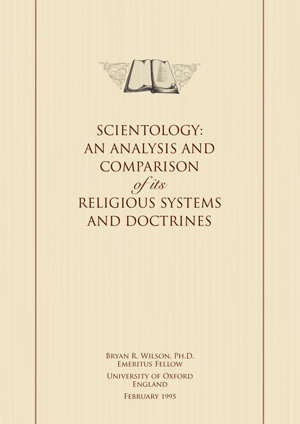CONTENTS INCLUDE:
- I. The Diversity of Religions and the Problems of Definition
- II. The Indicia of Religion
- III. Non-Theistic Belief Systems
- IV. Religious Language and the Evolution of Christian Theology
- V. The Social and Moral Functions of Religion
- VI. Scientology Briefly Delineated
- VII. A Sociological Analysis of the Evolution of the Church of Scientology
- VIII. Conceptions of Worship and Salvation
- IX. The Appraisal of Scientology by Academics
- X. Scientology and Other Faiths
- XI. Indicia of Religion Applied to Scientology
ABOUT THE EXPERTISE
In this piece originally published in 1999, Professor Bryan Ronald Wilson systematically analyzes Scientology’s religious systems and doctrines and places them in comparative context with Buddhism, Hinduism, Christian Science, Judaism, and Catholic and Protestant forms of Christianity. His analysis is made on the basis of academic study that commenced in 1968, including interviews with Scientologists and visits to Church sites in England. Differing definitions of religion have existed across time and cultures, he explains, but the Church of Scientology’s theology, practices and communal structures make it “clear to me that Scientology is a bona fide religion and should be considered as such.”
BIOGRAPHY
Bryan Ronald Wilson, Ph.D., (1926–2004) was reader emeritus in sociology at the University of Oxford. From 1963 to 1993 he was also a fellow of All Souls College, Oxford, and in 1993 was elected an emeritus fellow. For more than fifty years he conducted research into minority religious movements in Britain, the United States, Ghana, Kenya, Belgium, Japan and other countries. Dr. Wilson earned his doctorate in sociology from the London School of Economics in 1955, authored dozens of articles, and wrote or edited dozens of books, including: Sects and Society: The Sociology of Three Religious Groups in Britain (1961); Patterns of Sectarianism (edited, 1967); Religious Sects (1970, also published in translation in French, German, Spanish, Swedish and Japanese); Magic and the Millennium (1973); Contemporary Transformations of Religion (1976, also published in translation in Italian and Japanese); The Social Impact of the New Religious Movements (edited, 1981); Religion in Sociological Perspective (1982); The Social Dimensions of Sectarianism (1990); and A Time to Chant: the Soka Gakki Buddhists in Britain (1994). In 1984, the University of Oxford recognized the value of his published work by conferring upon him the degree of D.Litt. In 1992, the Catholic University of Louvain, Belgium, awarded him the degree of doctor honoris causa. In 1994, he was elected a fellow of the British Academy.





























